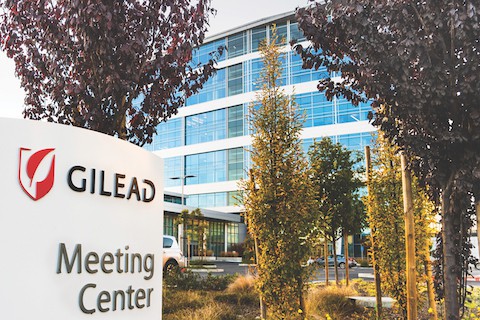
Gilead has issued a statement responding to the new COVID-19 strains discovered in the UK and South Africa, maintaining that its antiviral drug remdesivir should continue to be effective against the variants.
In the statement, Gilead announced that it had completed genetic analysis of ‘publicly available sequences’ for both the UK and South African variants.
The UK variant – known as B117 – is believed to spread more quickly and easily compared to the original SARS-CoV-2 strain.
Meanwhile, the South African variant, B1351, is thought to be more transmissible and has also been linked to higher viral load in infected individuals.
However, Gilead has remained confident that remdesivir has benefit against both the UK and South African strains.
‘The mutations identified in these new variants have not significantly altered the part of the virus that remdesivir targets or have any association with known mutations conferring reduced susceptibility of coronaviruses to remdesivir in vitro,’ the company added.
Gilead said that it would continue to evaluate any future emerging variants with the aim of understanding remdesivir’s efficacy against such variants.
Original article: published 23/10/2020
The US Food and Drug Administration (FDA) has approved Gilead’s remdesivir – now Veklury – for the treatment of hospitalised COVID-19 patients.
The full approval makes remdesivir the first and only treatment approved for COVID-19 in the US, following its earlier, limited emergency use authorisation.
Gilead’s antiviral drug scored an emergency use authorisation in May for use in patients hospitalised with a SARS-CoV-2 infection – the virus which causes COVID-19.
In the phase 3 ACTT-1 trial of remdesivir, treatment with Gilead’s drug resulted in clinically meaningful improvements across multiple outcome assessments when compared to placebo.
In the final day 29 results, remdesivir plus standard-of-care treatment were able to cut the time to clinical recovery by five days compared to placebo, with a median time to recovery of ten days with remdesivir treatment compared to 15 days in the placebo group.
According to Gilead, this result was most potent in patients who required oxygen at baseline – in this subgroup, patients receiving remdesivir achieved clinical recovery seven days faster than those in the placebo group, with a median time to recovery of 11 days for remdesivir and 18 days for placebo.
On Monday, the World Health Organization (WHO) published results from its own study of remdesivir, which it said showed remdesivir had little effect on COVID-19-associated mortality.
However, Gilead hit back at the results from this study, calling them ‘inconsistent’. The drugmaker told Reuters that “the emerging (WHO) data appears inconsistent, with more robust evidence from multiple randomised, controlled studies published in peer-reviewed journals validating the clinical benefit of remdesivir”.
Remdesivir has been touted as a potential treatment for COVID-19 since the early days of the pandemic, with the drug recently being administered to US president Donald Trump after he tested positive for the virus earlier this month.
In addition to the results from the ACTT-1 trial, the FDA approval is supported by results from two phase 3 open-label studies of remdesivir, which evaluated the drug in adult patients with severe and moderate COVID-19.
The study, SIMPLE-Severe, found that a five-day or a ten-day treatment course of remdesivir achieved similar outcomes in hospitalised patients who required supplemental oxygen but who were not mechanically ventilated.
Another study, SIMPLE-Moderate, showed statistically improved clinical outcomes with a five-day treatment course of remdesivir compared to standard-of-care treatment in hospitalised patients who did not require supplemental oxygen.
On top of the FDA approval of remdesivir, the agency also issued a new EUA for the use of the antiviral to treat hospitalised paediatric patients under 12 years of age weighing at least 3.5kg, or hospitalised paediatric patients weighing between 3.5kg and 40kg with suspected or confirmed COVID-19, where it is clinically appropriate.




